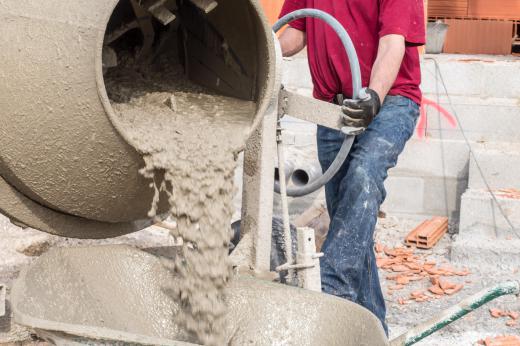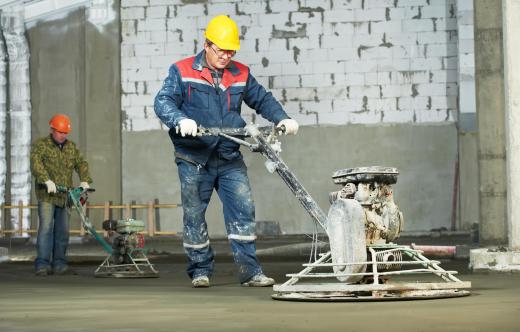A power trowel is a construction machine used to impart a smooth surface finish on freshly poured concrete slabs. This machine consists of one or two rotors which rotate parallel with the slab surface. Discs or multi-bladed attachments are spun against the still soft concrete surface by the rotors, thereby effectively smoothing out any blemishes or high spots. Power trowels are available as walk behind or ride-on machines. Both models are self driven as a result of the friction of the blades or disc on the concrete and are turned by applying additional pressure to a specific sector of the rotor.
When concrete slabs have been thrown, the surface of the concrete is uneven and rough. Most construction specifications require an even slab surface which requires the concrete to be smoothed before it sets and cures. A screed is used to smooth the surface on small slabs, sidewalks, and walkways. A screed is a flat wooden, steel, or aluminum beam that is drawn across the concrete surface to smooth out any high and rough spots. On larger slabs, this method is impractical, and the power trowel comes into its own as the preferred method of surface finishing.

Also known as a helicopter or power float, the power trowel is basically a simple platform that supports a vertically inclined gasoline engine driving one or two rotors. The rotors are horizontally inclined and consist of a fitting which drives a flat disc or multi bladed attachment reminiscent of a large fan. The drives of the power trowel are fitted with a clutch and a “dead mans switch” which allow gradual engagement and total disconnection of the drive should the operator lose his grip on the operating lever. Friction between the disc or blades and the concrete surface moves the power trowel forward and turns the machine when pressure is applied to one side of the rotor. Power trowels are available as smaller walk behind models and larger ride-on types.

The rotating action of the disc or blades flattens protrusions and fills hollows in the wet concrete surface, thereby creating a flat, even bed. It also brings the “fat” or mortar slurry in the concrete to the surface which creates a shiny, polished surface. Many older power trowels can't move in close to tight edges on the slab, thus necessitating hand troweling of these areas. Newer models feature specially designed blades which can polish the concrete surface right up to the edges and greatly speed up the finishing process.
